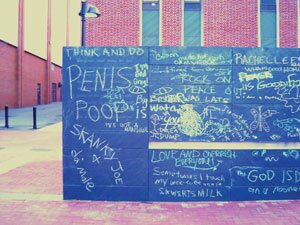ONARCHITECTURE- Constitutional dust-up: Can you read the writing on the wall?
Early one morning last week, with the sun just beginning to rise over the Pavilion, Charlottesville resident Kevin Cox was preparing to make Constitutional history (as far as we know) by being the first person to defend the First Amendment with a toilet brush.
Fed up with the assorted graffiti and often objectionable language scribbled on the chalkboard, Cox– who walks daily from Woolen Mills to his job at the UVA Medical Center– has decided to make a pre-work ritual of cleaning two sections of the wall.
Cox has been photographing some of the more unsavory postings. They include the correct term for male genitalia, "penis"; a playground word for feces, "poop"; and a slur against African-Americans considered so objectionable that most newspapers decline to spell it out.
"I love the idea of an interactive monument that teaches free speech," says Cox, "but this just isn't doing it."
Besides disliking the sometimes bathroom-stall scrawl, Cox hates the fact that the chalk marks often make it impossible to read the wall's two engraved inscriptions: the text of the First Amendment and a quote by late Supreme Court justice Thurgood Marshall.
So, armed with his toilet brush and a quart of water– which he says is the only effective way to remove the chalk from the wall's rough surface– Cox proceeds to erase everything around the two inscriptions. "You can't get an education if you can't read the text," he explains.
Josh Wheeler, associate director of the Thomas Jefferson Center for the Protection of Free Expression, which built and oversees the wall, concedes that the engravings get written over "quite a bit." However, unlike Cox, he doesn't blame people showing disrespect for the First Amendment; he simply believes they've run out of room to write.
"One thing that everybody underestimated was how much people would write," says Wheeler. "Originally, we planned to clean the wall once a week, but now we have to clean it twice a week. We're also looking into the idea of cleaning it more often than that to make room for more people to express themselves."
Still, Wheeler says he plans to present Cox's complaint to the citizens committee in charge of the wall, and they will decide if there's problem and what, if anything, should be done. Meanwhile, Cox says he'll continue to protect the inscriptions with his toilet brush and speak out against a monument design he believes is degrading to the First Amendment.
However, according to Constitutional attorney and Rutherford Institute president John Whitehead, the wall is functioning as it should.
"The First Amendment is there so people can obscure it," he says, pointing out that doing the same in other countries might get you jailed or worse. "Sure, it might be a problem if you can't see the text, but people can write over it if they want. I've got more of a problem with the wall's administrators wanting to change it."
Still, Cox appears intent on pushing for that change.
"Supporters of the wall seem to think that their acceptance of all the crap on here reflects a true embodiment of the principles of free speech," he says. "But what I feel most is sadness. I'm sad that the noble ideal of free expression in American life has been debased by a monument that serves as a platform for profanity, hate speech, vulgarity, and pornography."
As Cox points out, lewd and threatening expressions that might be unacceptable, even illegal, if they were expressed anywhere else are left to linger on the wall for days. In fact, Cox describes an incident not long ago when he pointed out a racial slur on the wall to an African-American city police officer on duty in the area.
"He read it and appeared to become very angry," says Cox. "He snarled, 'Well, there's nothing I can do it about it. We're not allowed to touch that thing.'"
However, the police are allowed to arrest someone caught writing specific threats on the wall. As the Hook has reported, pro-life advocate John Giuliano was arrested last December after he was seen writing a statement on the wall potentially threatening employees of Planned Parenthood.
Cox points out that comments he's documented– including "Kill the ni**ers," "I f***ed your momma," and "Kill the cops"– have a far more disturbing impact than comments like "Have a nice day."
While Wheeler admits that some expressions on the wall have been objectionable, even constituting illegal speech, he points out that the vast majority of what is written is not. He also points out that citizens are free to erase anything they oppose, and that threatening speech, regardless of whether its author is caught in the act, can be removed by the police if they believe it constitutes a danger to the public.
"Is it really necessary to tolerate this very public display of the foulest human language to protect our First Amendment rights?" Cox asks. "I don't think it's necessary or even a good idea. I'm also bothered by the view that this chalkboard is just a 'reflection of our culture.' It's more than that. It's also an influence."
While Whitehead doesn't share Cox's intolerance for those who use bad language, referring to himself as more of a "free speech purist," he admires what Cox is doing. "It's great that he disagrees. He's playing a part in the game, and it's a great game," Whitehead chuckles. "Guys with toilet brushes are what make America great."

Armed with a toilet brush, Charlottesville resident Kevin Cox intends to fight the "assorted graffiti" that covers the words of the First Amendment on the Free Speech Wall.

Free speech or obscenity? While chalkboard advocates say it embodies the spirit of free expression, critics like Cox say it's merely a "platform for profanity, hate speech, vulgarity, and pornography."
#